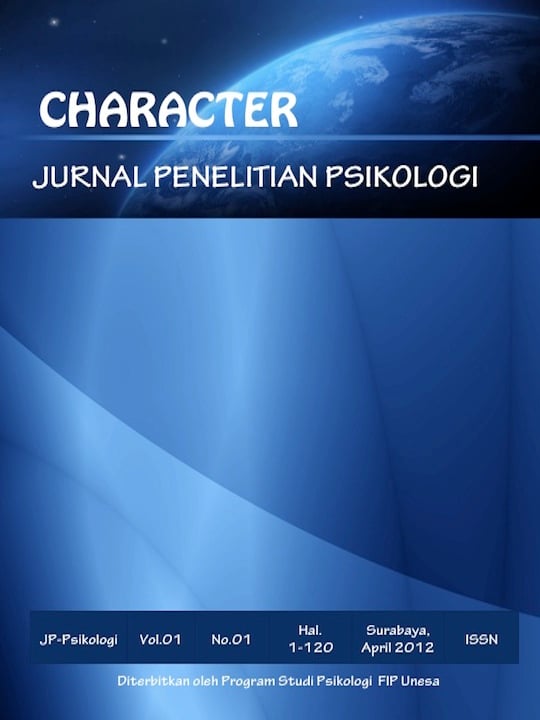HUBUNGAN ANTARA KONSEP DIRI DENGAN PERILAKU ASERTIF PADA MAHASISWA PSIKOLOGI UNIVERSITAS NEGERI SURABAYA
DOI:
https://doi.org/10.26740/cjpp.v8i9.48225Abstract
Abstrak
Mahasiswa bersosialisasi bertemu dengan berbagai macam orang, termasuk teman kuliahnya. Untuk aktif dan terbuka terhadap teman sebayanya dalam situasi ini, siswa harus mampu mengungkapkan perasaannya atau berperilaku asertif. Mahasiswa yang memiliki konsep diri yang positif membuat dirinya lebih terbuka dengan sesame lain. Tujuan dari penelitian ini adalah untuk mengetahui hubungan antara konsep diri dengan perilaku asertif pada mahasiswa psikologi Unesa. Pendekatan kuantitatif korelasional digunakan dalam penelitian ini. Subyek penelitian ini adalah 139 mahasiswa Psikologi Unesa. Teknik simple random sampling digunakan untuk sampel penelitian. Skala Likert dengan variabel konsep diri dan perilaku asertif digunakan untuk mengumpulkan data. Uji korelasi product moment Pearson digunakan untuk menganalisis data dengan aplikasi IBM SPSS 24.0 for Windows. Analisis data menunjukkan tingkat signifikansi 0,000. Hal ini membuktikan adanya hubungan yang signifikan antara konsep diri dengan perilaku asertif pada Mahasiswa Psikologi Universitas Negeri Surabaya. Untuk nilai koefisien korelasi sebesar r: 0,714, yang berarti adanya hubungan yang kuat antara konsep diri dengan perilaku asertif. Mahasiswa Psikologi Unesa memiliki konsep diri yang kuat sehingga hal tersebut membuat dirinya lebih terbuka dan tidak memendam perasaannya kepada orang lain. Studi ini menemukan bahwa semakin tinggi konsep diri seseorang, semakin besar kemungkinan mereka untuk bersikap asertif.
Kata Kunci: Konsep diri, perilaku asertif.
Abstract
Students socialize to meet various kinds of people, including college friends. To be active and open to their peers in this situation, students must be able to express their feelings or behave assertively. Students who have a positive self-concept make themselves more open to others. The purpose of this study was to determine the relationship between self-concept and assertive behavior in Unesa psychology students. A correlational quantitative approach is used in this study. The subjects of this study were 139 Unesa Psychology students. Simple random sampling technique was used for the research sample. Likert scale with self-concept and assertive behavior variables was used to collect data. Pearson's product moment correlation test was used to analyze the data with the IBM SPSS 24.0 for Windows application. Data analysis showed a significance level of 0.000. This proves that there is a significant relationship between self-concept and assertive behavior in Psychology Students, State University of Surabaya. For the correlation coefficient value of r: 0.714, which means there is a strong relationship between self-concept and assertive behavior. Unesa Psychology students have a strong self-concept so that it makes them more open and not harboring feelings for others. The study found that the higher a person's self-concept, the more likely they are to be assertive.
Keywords: self concept, assertive behavior.
Downloads
Downloads
Published
How to Cite
Issue
Section
License
Authors who publish in this journal agree to the following terms:
Copyright in any article is held by the author.
The author grants the journal, publication rights with the work simultaneously licensed under a Creative Commons Attribution License that allows others to share the work with an acknowledgment of the work's authorship and initial publication in this journal.
Authors may enter into separate, additional contractual arrangements for the non-exclusive distribution of the journal's published version of the work (e.g., posting it to an institutional repository or publishing it in a book), with an acknowledgment of its initial publication in this journal.
Authors are permitted and encouraged to post their work online (e.g., in an institutional repository or on their website) prior to and during the submission process, as this can lead to productive exchanges, as well as earlier and greater citation of published work.
 Abstract views: 612
,
Abstract views: 612
, PDF Downloads: 771
PDF Downloads: 771





